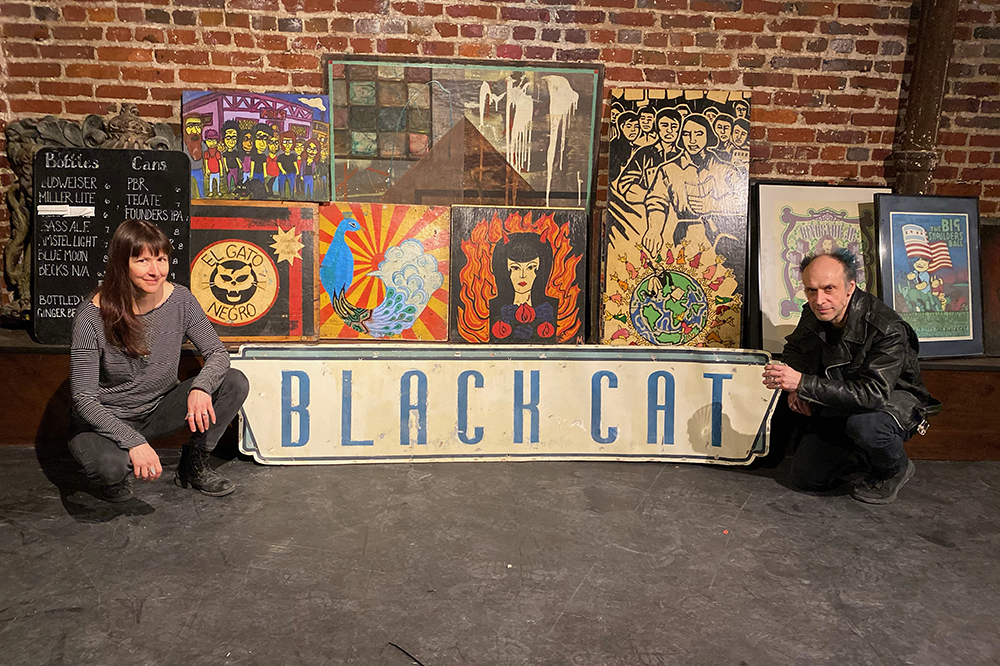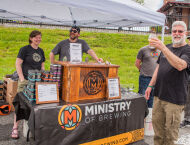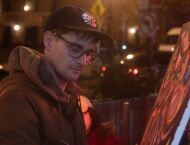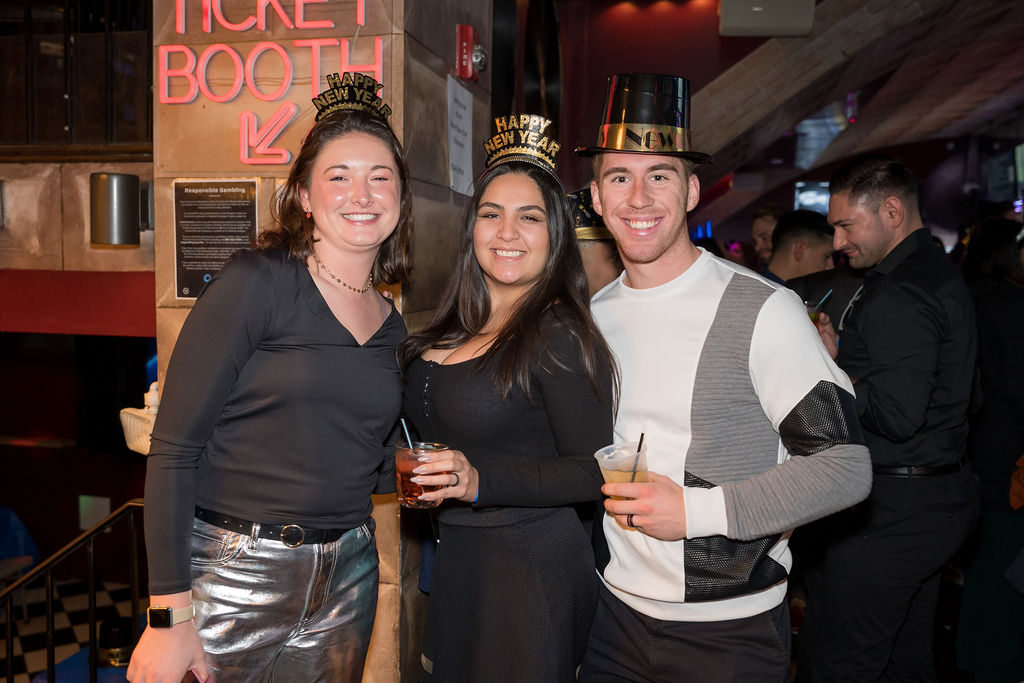Music
 Dante and Catherine Ferrando. Photo courtesy of subject.
Dante and Catherine Ferrando. Photo courtesy of subject.
Venues Reflect on a Year Without Live Music
March 12, 2021 @ 10:00am
Around this time last year, waves of live event cancellations began to crash throughout D.C. Even as nonessential businesses like music venues shut down and many events were rescheduled, we collectively held our breath for the pandemic to be a blip on our radar so we could get back to concerts, comedy shows and other live gatherings as soon as possible.
Recognizing the impact that even a small amount of time closed could have on the live music and entertainment industries, stakeholders were quick to form the National Independent Venue Association (NIVA) within days of the advent of the pandemic’s hold on regular life. The shutdown turned from weeks to months, and NIVA remained active in trying to pass the Save Our Stages Act (now the Shuttered Venue Operators Grant). In December, it looked as though there was a light at the end of the tunnel – the newly named SVOG was passed as part of a $900 billion Covid-19 relief package.
The Small Business Administration (SBA) will be administering the funds through an application that will become available in April. And just this week, a new relief package tacked on $1.25 billion to the SVOG, and an amendment to the original package that now allows venue owners to apply for access to money available through the SVOG in addition to a Paycheck Protection Program (PPP) loan. As it stood in December, venues were ineligible to apply for both.
Though there have been positive developments, venues are still struggling. This leaves many venue owners in a still complicated holding pattern dependent on funding, unclear reopening stipulations and more. Dante Ferrando, owner of the Black Cat, notes frustration with the lack of communication as to if and when he’ll be able to open his doors.
“It’s possible we will be closed all through summer, and then be full capacity in October or November. [The city] should be able to tell us, ‘Hey, we’re going to ease you back in and we don’t know when it’s going to start, but it’s going to look something like this. It’s going to be quarter capacity or it’s going to be per square foot.’ So far, it’s been very clear they’re not going to treat us anything like restaurants or anything like that. We’re just screwed. No two ways about it.”
Ferrando notes that an upside was receiving money through the District’s Entertainment Bridge Fund, which provided $29.5 million in funding to both venues and businesses that heavily rely on live events as part of their programming. However, he says it will be eaten up almost immediately just to cover rent costs, and hopes the venue will be looking toward better days when the SVOG money comes through.
“That’s actually a substantial amount of money,” Ferrando continues, “and that would allow us to do something. Now, what I don’t know is what we’ll be allowed to do.”
In the meantime, Ferrando and team are hosting livestreams when it makes sense for them, including his band The Owners, which includes his wife and co-owner Catherine Ferrando, Al Budd of The Shirks, and Laura Harris of Ex Hex and The Aquarium. The four-piece band is releasing a demo and will be playing a show that’s available to livestream for free via YouTube at 8 p.m. on March 12.
They also saw some community support through a partnership with Vans, who sold merch featuring the name and a logo of the venue, and through sales of staff-designed merch available on their site. Quarantine has also given the venue time to complete renovations to the space. Ferrando looks forward to patrons experiencing the renovations when they reopen.
At The Wharf’s Pearl Street Warehouse, co-owner Nick Fontana expresses similar frustrations around the lack of guidance in recent months. Pearl Street also received money from the Bridge Fund, but notes it was just enough to enable the venue to keep staff employed and didn’t necessarily allow them the resources to do anything that would turn a profit. Despite having a kitchen and two bars, the overhead of quarantine-level operations was too high in colder, slower months and the venue temporarily closed for the season in mid-December.
“When the weather was nice and the outdoor patio was doing okay, [we did the] mayor’s pilot music program, which was kind of a dog and pony show,” Fontana explains. “[Patrons were] 30 feet from the stage, which only gave us 26 seats [to fill]. It was kind of ridiculous.”
He says it was hard to say no to, but with 26 people inside, you couldn’t pay for the sound guy and give the band a couple hundred bucks. Once that program ended and winter came, they decided it made more sense to pause operations for the time being.
“So we closed. We were just losing too much money again, and burning cash we need to get reopened.”
Fontana and his team are currently trying to gauge whether or not opening mid-month to welcome patrons as just a bar and restaurant is both feasible and profitable for their business. Until then, he’s grateful for community support, such as those who have purchased gift cards over the past year, and for Pearl Street’s recent Wammie nomination for Best Live Music Venue. While Pearl Street, alongside most venues, will have to reconfigure the way things are run once reopening is a reality, they’re hopeful they can provide a space to pick back up on live shows as well as events and weddings that once packed the space.
“We think there’s going to be a bunch of bands who want to play, and people are going to want to get out,” he says. “There should be lots of talent and even bigger names that can’t play large venues. So that may be in our wheelhouse: [getting] some bigger names that maybe can’t play one night to 3,000 people, but could do three nights of 250 people.”
Blues Alley is also looking at how the world will be different upon reopening, mainly as they try to find a new location after the iconic venue spent over 50 years in its Georgetown space. While they navigate this change in addition to the overall complications of the pandemic, Harry Schnipper, Blues Alley’s executive director, says they are alive and well.
All things considered, they’ve had a busy year keeping locals connected to their programming and mission despite the inability to be in person. Blues Alley kicked off its Monday Night Jazz series at the National Press Club last November, available to livestream each week. They’ve partnered with the Japanese Embassy to virtually present their Japanese Jazz series as part of the National Cherry Blossom Festival, among other virtual events and happenings keeping their calendar packed.
“We’re pretty much the gold standard in the industry in terms of our ability to provide entertainment,” Schnipper says. “I often say to people that Blues Alley produces, promotes or presents at least one artist or event every day, and we have every expectation that we are going to continue to do hybrid performances for the foreseeable future.”
Schnipper notes a positive that came out of the pandemic was their world expanded – through virtual programming, Blues Alley opened up to national and global audiences, expanding their reach even before things begin to reopen.
Similarly, Songbyrd Music House and Record Cafe has expanded their orbit greatly over the course of the pandemic, both virtually and in-person. In November, their team opened Byrdland Records in Union Market, selling vinyl and music accessories, and maintaining a steady stream of virtual shows. Songbyrd also received Bridge Funds from the city, allowing them a lifeline while awaiting SVOG funds and other changes.
Additionally, through a partnership with local band Rosie Cima & What She Dreamed, Songbyrd is ensuring that local artists playing livestreams are able to be paid for their participation through their joint Gig Guarantee fund. The venue plans to utilize their mobile concert space, a 1978 Chevy C10 called the Byrdmobile, when the weather warms up.
Owner Joe Lapan says while times have been tough, the sense of community they’ve forged and advocacy he and his team engaged in has been positive, and something they hope to continue as things reopen.
“We very much participate in the advocacy conversations around all the issues facing the D.C. music scene and small business generally,” Lapan says. “We participated in the judging process for this year’s virtual Wammie Awards. We love our music community and always want to be there to lend ourselves to sustaining and furthering it.”
Lapan says he looks forward to reopening and notes that they intend to be fully compliant with any guidelines put forth for safe reopening, and that the next month will be telling in terms of vaccinations, changes to gathering guidelines and monetary rollouts via the SVOG. In the meantime, tangible support is felt through purchases from Byrdland and tuning into livestreams.
While challenges and measures of support for venues looks different on a granular level, most venues are in need of tangible support. While the SVOG, opening of PPP loans to venues and Bridge Funds all add up to make a difference, NIVA is also doing what they can to keep beloved independent venues going at this one-year mark. Audrey Fix Schaefer, director of communications for NIVA and communications director for IMP, discusses a few ways you can support your favorite venue while waiting to support them safely in the future.
“Look at your favorite venue’s website and see if there’s a place to donate, or buy a gift card or merchandise,” Fix Schaefer says. “Nationally, NIVA has an Emergency Relief Fund, and we’ve been raising money to help venues that are at the greatest risk of going under while they wait for the federal relief. So far, we’ve been able to help about 180 venues across the country, but the need is still so great.”
For more on NIVA, the SVOG grant and the Emergency Relief Fund, visit www.nivassoc.org and follow @nivassoc on Twitter and Instagram. Venue events, news and ways to support can be found below.
Black Cat: 1811 14th St. NW, DC; www.blackcatdc.com // @blackcatdc
Blues Alley: 1073 Wisconsin Ave. NW, DC; www.bluesalley.com // @bluesalleydc
Byrdland Records: 1264 5th St. NE, DC; www.byrdlandrecords.com // @byrdlandrecords
Pearl Street Warehouse: 33 Pearl St. SW, DC; www.pearlstreetwarehouse.com // @pearlstreetlive
Songbyrd Record House + Music Cafe: 2475 18th St. NW, DC; www.songbyrddc.com // @songbyrddc
Enjoy this piece? Consider becoming a member for access to our premium digital content. Support local journalism and start your membership today.








